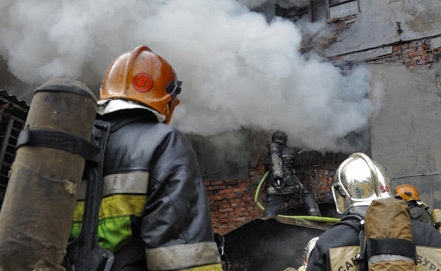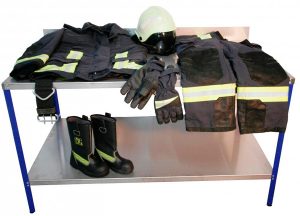Fire protection of the Russian Federation. On the liquidation of the private fire department and the transfer of its property to other types of
The private fire department began to be created in December 1991. Immediately after the death of the USSR and the proclamation of capitalism in Russia. Until 1993, the activities of "ICHP" (individual private enterprises, as the current "LLC" were called in those years) for extinguishing fires were not prohibited by law, and therefore allowed. Somewhere since 1993, the activity of the IChP in extinguishing fires began to be licensed in accordance with the Orders of the Ministry of Internal Affairs of the Russian Federation. the federal law about licensing certain types activity appeared only in September 1998. Existing since 1991, private fire protection, as a type of fire protection, was included in the Federal Law "On fire safety"only in August 2004, the famous FZ-122. Since then, THIS IS THE LEGAL TYPE OF FIRE PROTECTION.
Why did the current Minister of Emergency Situations Puchkov dislike the private fire department? Which he, in a Bolshevik way, decided to liquidate as a class, sorry, as a species, on July 20, 2017! And he didn’t like it that the CPO in the competition began to win “contractual units of the FPS GPS EMERCOM of Russia”! This is what experts have foreseen since 2008, and argued their predictions on the pages of the site “0-1. RU". The fact is that the leadership of the Ministry of Emergency Situations and Puchkov personally, when he was a deputy minister and was engaged in lawmaking, did not solve one of the main, strategic issues in organizing the FPS, the State Fire Service of the Ministry of Emergency Situations of Russia. They have not been able to approve in the Government of Russia the LIST OF OBJECTS ON WHICH THE SFS (FPS) IS MANDATORY CREATED, which was provided for by the early versions of the Federal Law “On Fire Safety”. Eh, if they had done this by the middle of 2008, it would have made no sense to come up with “contractual divisions of the FPS”, and there would have been an OBJECT FIRE PROTECTION of the State Fire Service of the Ministry of Emergencies, CREATED MANDATORY at large public and private industrial, as well as military facilities, and there would have been would, and quietly flourished, private fire protection, in distant fields, where the creation of the State Fire Service of the Ministry of Emergencies is not necessary!
But Puchkov, being a deputy minister, failed this work. And since 2009, the “contractual FPS of the Ministry of Emergency Situations” began to steadily roll into the abyss, losing tenders, like an economically clumsy government structure overflowing with unnecessary managerial posts ...
Therefore, by July 2017, Puchkov understood the only way to win in the competition with PPO, this is to eliminate it as a type of fire department. “AVOID the private fire department,” as he writes in his letter to the leaders of the Subjects of the Federation of the Russian Federation! But something like this understanding needs to be justified! And the Ministry of Emergency Situations does not have clear facts of poor combat readiness of the ChPO and poorly extinguished fires. Therefore, in his letter, Minister Puchkov is simply lying.
Well, for example, Puchkov is lying that the CPO is a more expensive fire department! Alas, the more expensive ones are his contractual divisions of the Federal Border Guard Service of the Ministry of Emergencies, which is why they lose in tenders!
Puchkov writes in his letter that the ChPO is more poorly equipped and trained. But this is not true! CPO is equipped in accordance with the requirements of the Regulations that people from Puchkov from DND present to CPO Customers. It is equipped in accordance with license requirements! After all, it was Puchkov’s people who prepared the project and coordinated Decree of the Government of the Russian Federation No. 69 of 2012 “On licensing fire extinguishing activities”! After all, it is Puchkov's people who check the equipment, education and training of the ChPO units and issue them Licenses for firefighting activities! If the Ministry of Emergency Situations issued a license, then everything is fine with the equipment!
Puchkov writes in his letter that the ChPO does not take part in the activities of the fire and rescue garrisons! Again not true! The participation of the CPO in the activities of fire and rescue garrisons is regulated by the Order of the Ministry of Emergency Situations of the Russian Federation of May 5, 2008 N 240 "On approval of the Procedure for attracting forces and means of fire departments, fire departments to extinguish fires and conduct emergency rescue operations." By this Order, the Ministry of Emergency Situations established that the PPO takes part "BY AGREEMENT with the owner of protected organizations." Hello!!! Chiefs! This is how the Ministry of Emergency Situations DEFINED it, and not the ChPO puts sticks in the wheels of fire and rescue garrisons!
Puchkov writes that the training of PPO personnel is not carried out on an ongoing basis! Another lie! Training at the ChPO is carried out on the basis of licensing requirements established by the Russian Federation Decree No. 69-2012 and the Order of the Ministry of Emergency Situations of the Russian Federation dated December 12, 2007 No. 645. All these documents were prepared in the depths of the central apparatus of the Ministry of Emergency Situations of the Russian Federation. As you wrote in them, it is being conducted, and if it is not being conducted in this way, then the Ministry of Emergency Situations has the legal right to suspend the license of the PPO, and not complain to the heads of the Subjects of the Russian Federation
Puchkov also praises departmental, municipal and voluntary fire protection. Virtually no existing species fire department!
Large subdivisions of departmental fire protection (with the exception of departments not supervised by the Ministry of Emergency Situations: Ministry of Defense, Russian Railways, Civil Aviation and something else secret there) DO NOT EXIST in Russia. Even the largest private fire brigade, which was created back in Yukos, and then transferred to Rosneft: Rosneft-Fire Safety, it is not departmental, it is LLC, i.e. joint-stock, i.e. private, i.e. also works for profit. The same is true for Gazprom subdivisions.
The municipal fire brigade was covered with a copper basin a long time ago when the State Fire Service of the Subjects of the Russian Federation was created. GPS subjects and absorbed the entire IGO. There is NO municipal fire department in Russia!
The voluntary fire brigade is a "filkin's letter", everyone knows that Puchkov ordered that the DPO be a MILLION DOBROVTS! As the minister ordered, they did it! This was reported to the minister. They say here it is, a million volunteers! No one will audit this million volunteers. Licensing for extinguishing fires for DPO was canceled in time, which means there is no need to check.!!! And the paper will endure everything! GENTLEMEN DO NOT CHECK, GENTLEMEN BELIEVE THE WORD!
And even in his last phrase, Puchkov managed to write a lie that the abolition of the private fire department, ...... I quote: "will reduce the financial burden on the budgets of all levels, reducing the cost of ensuring fire safety" ... Baby!!! …Let's guess! Here in the CPO where I, a personnel specialist in the fire department, work, I own about 50 main and special fire trucks, as well as two of my own repair bases! They didn’t steal, but acquired and built over the 25 years of our organization’s existence, since 1991 an individual entrepreneur, and since 1999 an LLC, to provide services in the field of fire extinguishing. All this movable and immovable property is the property of the founder of our PPO. We protect distant oil fields, at a distance of 60 to 150 km. from the locations of the units of the Federal Border Guard Service of the Ministry of Emergency Situations of Russia. Every day, about half of these vehicles are in the combat crew ... Attention to the question! Now, if we are DISCONTINUED, who and with what money will immediately buy, well, if not 50, then 25 fire trucks to replace us (and we won’t leave our cars to Puchkov, it’s better to sell them as scrap metal and for spare parts so that Minister Puchkov wipes himself off)? The guarded facilities where we are standing do not have their own fire trucks and there is no money to buy new fire trucks! Puchkov also doesn’t have money for new cars to replace us, he would be in the city divisions of the FPS old equipment to change to a new one, and then a little joy! The subject of the Russian Federation also does not have money for such a quantity of new equipment, even for a couple of new fire trucks. The subject would have fire trucks in the State Fire Service Slowly replace the subject for the protection of rural settlements ... I’m not talking about municipalities, they haven’t bought fire trucks for 20 years, they somehow scrape a pretty penny for motor pumps in the villages ... So I just talked about 50 firefighters cars of our CHPO! And how many such CPOs are there throughout Russia? Puchkov considered it?
Final question. What stupid asshole, or what assholes, came up with the idea of abolishing the CPO in the current hungry and creditless years, and what kind of asshole performer prepared this letter for Puchkov to sign?
Everyone can put out a fire in the forest, but what if a real fire happens? Who will come to the rescue and save people? You guys certainly know that brave firefighters fight fires! These people, at the first signal, will rush to the scene and eliminate the fire of any complexity. Perhaps you saw huge red cars rushing with a roar of sirens - these are brave firefighters who went to the rescue. Did you know that firefighters work all day long! The shift starts at eight o'clock in the morning and ends at the same time the next day.
Employee Requirements
Firefighters not only put out fires, but also prevent them. Employees of the Ministry of Emergency Situations monitor the construction of each building in a city or village. If it does not meet the fire safety rules, then no one will receive permission to build. Firefighters regularly inspect educational establishments, restaurants, offices, hospitals for fire extinguishers, fire hoses, emergency exits and an evacuation plan. These measures significantly reduce the risk of fire and unnecessary casualties.
And firefighters conduct conversations in schools and kindergartens. Real rescuers talk about fire safety measures, correct behavior in a burning room or forest, about the consequences of playing with fire.
You guys already know that firefighters have to be brave, strong and agile, but there are so many more requirements for rescuers! Let's put together a list of the qualities of firefighters:
Did you know that firefighters have their own honor code? Upon entering the service, they take a special oath, pledging to fulfill all the rules set forth in the collection.
In order to meet the requirements of the profession, firefighters train a lot. At the station, a gym is equipped for them so that the rescuers are always in shape. Also, fire fighters in special rooms work out for a while each possible situation(for example, throw a hook through the window and catch on the window sill, and then get into the room along the cable in six seconds). Firefighters also study hard and hard. There are also special classes at the station, where senior specialists introduce the intricacies of fire fighting..
Firefighters are usually strong boys and men, but women also work in fire departments. More often they work as dispatchers. This profession requires care and precision, which girls successfully cope with. - important person in a team: he takes calls, finds out what and where is on fire, finds the nearest hydrant on the map and calculates the shortest route to the scene.
Combat equipment
It is not sewn from ordinary fabric, but from a special one. It does not burn in fire and heats up little. Such a fabric is called aramid, its fibers include impregnated by special means semi-linen and vinyl artificial leather (or leatherette). Clothing materials vary depending on the severity of the fire.


The kit includes:
- protective jacket;
- overalls;
- comfortable and durable boots;
- wadded jacket and pants;
- protective gloves;
- heat-reflecting metal suit;
- heat-reflecting mask with a respirator;
- gas mask with a cover;
- metal and plastic helmets;
- cape mask.
Thanks to such equipment, firefighters do not care about heat and fire!
You know, children, firefighter equipment is very important! With it, you can break through the obstacles that have arisen, get into the building through the window, and so on.
Mandatory at each exit are items that ensure breathing in a smoky room: respirators, gas masks and filters.
They are attached to a special belt and stored in cases. To illuminate the road in dark rooms, every firefighter should have a flashlight.
To overcome various obstacles, fire fighters carry a lot of equipment. brave rescuers cut through collapsed beams and boards; for convenience, this tool is attached to the belt. Fire ropes and rope ladders, a holster and a carabiner allow you to climb into hard-to-reach places, pull people, animals and things out.
Sometimes electrical appliances and wires become the cause of fire. To eliminate the fire in this case, you must first de-energize the problem. Extinguishing electrical appliances with water is life-threatening! For such situations, firefighters have special boots, mats and scissors in their arsenal.
For emergency evacuations, rescuers use a variety of: stick ladder, mechanical sliding ladder, assault ladder. They allow you to rescue people from high floors.
How fire is extinguished
In fact, there are several ways to extinguish a fire. For a long time the most famous and widespread is water. To supply it throughout the city, there are fire hydrants, to which a hose (fire hose) is attached. Also, water is transported in tanks by special fire trucks. It is pumped out of them with special manual or mechanical pumps.
 different types, that is, filled different substances. Some are filled with gas (for example, carbon dioxide, hydrocarbons and aerosol), others are filled with foam (cannot be used to ignite electrical appliances and combustible fuels like gasoline), and still others are filled with powder.
different types, that is, filled different substances. Some are filled with gas (for example, carbon dioxide, hydrocarbons and aerosol), others are filled with foam (cannot be used to ignite electrical appliances and combustible fuels like gasoline), and still others are filled with powder.
Did you know that the first fire extinguishers appeared in the first quarter of the 18th century? In 1715, the German inventor Zacharias Greil patented a device that was a barrel of strong wood filled with twenty liters of water. A wick and a container of gunpowder were attached to the vessel. The fire extinguisher was thrown into the fire, where it exploded, thereby extinguishing the fire. And at the beginning of the 19th century, the Englishman George Manby invented the fire extinguisher in the form that we see today. His device was a copper vessel filled with chemical powder under high pressure.
If a fire suddenly occurs, you must call "01", provide the address and what specifically ignited. After receiving the alarm signal, the dispatcher calculates the shortest route, locates the fire hydrant on the map and passes all the information to the rescue team. All of these actions take less than 60 seconds. Having received an alarm signal, firefighters fully gather in 20 seconds and go to the rescue.
This is a very dangerous and nerve-wracking profession, so every firefighter must be stress-resistant, have lightning-fast reactions and be in excellent physical shape.
What kind of education is needed?
To qualify as a fireman, you don't have to have higher education. It will be enough to have a high school diploma vocational education received by a future employee of the Ministry of Emergency Situations in a college, technical school or college. The basis for obtaining knowledge in these institutions is considered workshops with equipment and technology.
A high position can be obtained by studying at the academies of the Ministry of Emergency Situations. Apart from practical knowledge in universities and institutes, a serious theoretical foundation is being laid, helping to better get used to new job understand how to behave in each situation.
 Maybe you noticed in old pictures that almost all firefighters have long mustaches? This is by no means an ornament, like that of the hussars, it was useful in the service. While extinguishing the fire, firefighters wetted their mustaches in their mouths and inserted them into their noses. Such a trick helped to breathe even in a very smoky room. It is from this that the expression "wet mustache" came from.
Maybe you noticed in old pictures that almost all firefighters have long mustaches? This is by no means an ornament, like that of the hussars, it was useful in the service. While extinguishing the fire, firefighters wetted their mustaches in their mouths and inserted them into their noses. Such a trick helped to breathe even in a very smoky room. It is from this that the expression "wet mustache" came from.
The main functions of the fire department are to protect the population, objects and property from fires. For their implementation, the following tasks are performed: fire prevention; elimination of fires; rescue operations; ensuring the operation of the system.
In legislation and practice, fire protection means the unification of various organizations, both state and private forms property. Such organizations include supervisory authorities, structural, territorial and fire and rescue units, educational and research institutions, as well as voluntary organizations.
Prevention
One of the main tasks of the fire department is to help minimize the occurrence of fires. Supervisory authorities monitor compliance with all fire safety standards and legal requirements. To do this, all enterprises are periodically inspected in order to identify shortcomings in time. Appropriate regulations at the enterprise eliminate the persons responsible for fire safety.
Surveys are carried out, including the study of document flow, the availability of the necessary fire fighting devices, equipment, arrangement of emergency exits and others important details. Projects of future buildings and structures are also being tested. Without the approval of the supervisory authorities, the acceptance of a construction object into operation is impossible. The method of influencing negligent managers and their employees is orders and fines.
In addition to inspection, education and public awareness play an important role in fire prevention. Seasonal fires in forests, peatlands, and other arid areas are often caused by human actions, as well as dangerous situations at home. Therefore, experts resort to appeals through the media, posters, and organize educational programs for children and adults.
These measures are complemented by the obligation federal bodies authorities to regulate and update the regulatory and legislative framework in this area. The functioning of the system as a whole and the ways in which its parts work depend on them. Also, officials are in charge financial matters targeted programs at the federal level. Recently, due to the law "On technical regulation» many regulations acquired the form of regulations, the effect of which applies to the units of the Ministry of Emergency Situations.
Rescue work
The elimination of fires occurs in stages. First of all, the fire brigade receives a report of the incident. Further, employees with equipment go to the place of the call, having previously analyzed the information. Upon arrival, reconnaissance of the place, emergency rescue operations, and direct elimination of the fire are carried out. Depending on the situation, the fire extinguishing manager may order the execution of special works that are allowed to be carried out simultaneously. There are several ways to extinguish and contain fires. The so-called is calculated in advance, and in accordance with it, the forces of the unit are concentrated. After the fire is extinguished, the calculation returns to the unit.
When eliminating fires, firefighters have the right to use the property of citizens that will be needed for communication, movement or extinguishing.
Their duties include the evacuation of people, the provision of first aid, the creation of barriers to the spread of fire. As a rule, strangers are not allowed to the scene of the incident or access is restricted in order to avoid casualties and disruption to work. First health care it turns out under certain conditions of the victims, the list of which is approved by order of the Ministry of Emergency Situations. The fire department responds to fires with calls, verbal messages, visible signs of fires, or when a signal is received in automatic systems alerts.
An individual is appointed. Such an employee makes all key decisions, defines boundaries and can involve ordinary people. The work of the fire department is regulated by the combat charter. The duty changing of the guard is always in full readiness. Employees wear uniforms, strictly observe discipline. Professional skills and physical training are maintained at a high level.

All calls are accepted. He must monitor the situation in the area, know the important objects and their characteristics, be aware of the state of machinery and equipment. Keeps logs, where he records incoming calls, and is in touch with departments. Submits performance reports to superiors.
Organization of health
Fire protection is a complex state tool. Such a system can be managed only with planning and strict control. The work of any body, unit, and even a volunteer is regulated by the Federal Fire Service.
To ensure the correct functioning of the system, it is necessary to know the real state of affairs in the fire department. Collecting and processing data on technical means firefighting. The work of all departments is controlled, measures are being taken to modernize equipment and improve the skills of employees. Also federal Service solves administrative issues related to personnel, oversees logistics.
According to the regulations, he takes part and contributes to the conduct of special examinations of fire-fighting equipment and licensing works. Partly coordinates the activities of accredited certification bodies within its competence. This also applies testing laboratories. Organizations must be included in the system of the Ministry of Emergency Situations.
It is important to protect the work and life of firefighters. The Ministry of Emergency Situations has developed and implemented regulations for firefighters, defining measures for their protection. Employees of the State fire service are entitled to receive free clothing and equipment special purpose. Supplied machines, equipment for extinguishing, means personal protection and suits of firemen are subject to certification.
Plans are being made to improve the work of the fire department. They are developed for several years ahead and affect all aspects of the activity.
Efficiency is assessed through indicators. Thus, the implementation of targeted safety programs of past years has led to a decrease in mortality, the total number of victims, and economic damage by more than 20% during fires. The programs are aimed at introducing advanced technologies and improvement of the material base.

Hierarchy in management
The first link in the chain of governing bodies is the Government of the Russian Federation, which exercises general leadership. The second position is occupied by the Ministry of Emergency Situations, but a fairly large part of the units are subordinate to other departments. For example, extinguishing forest fires is not an official responsibility of the said ministry, but is subordinate to Rosleskhoz. However, departmental fire brigades coordinate their activities with the Ministry of Emergency Situations.





